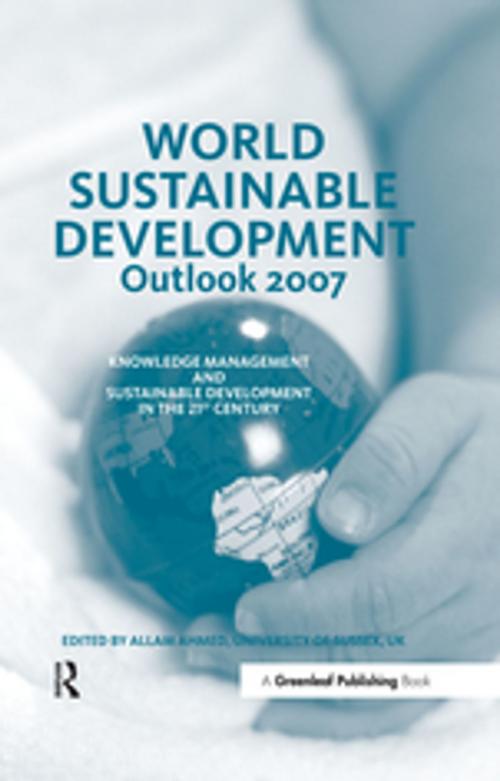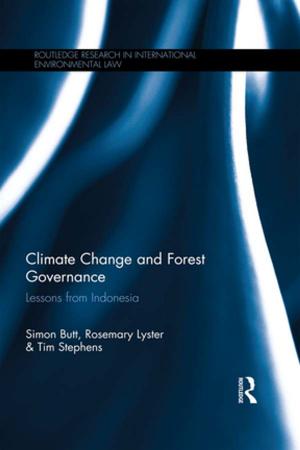World Sustainable Development Outlook 2007
Knowledge Management and Sustainable Development in the 21st Century
Business & Finance, Business Reference, Business Ethics, Management & Leadership, Management| Author: | ISBN: | 9781351280228 | |
| Publisher: | Taylor and Francis | Publication: | September 29, 2017 |
| Imprint: | Routledge | Language: | English |
| Author: | |
| ISBN: | 9781351280228 |
| Publisher: | Taylor and Francis |
| Publication: | September 29, 2017 |
| Imprint: | Routledge |
| Language: | English |
The World Sustainable Development Outlook series has been developed to provide an overview of sustainable development, to discuss why it is important and to provoke forward thinking on the development of a more coherent approach to solving global problems related to sustainability through science and technology. In doing so, a holistic approach is used to critically examine the interrelationship between the natural, governmental, economic and social dimensions of our world and how science and technology can contribute to solutions.
This is a truly global source book, which is reflected in the varied national and cultural origins of the contributors, as well as the topics and case studies covered. Each year a different theme will be covered. The theme of World Sustainable Development Outlook 2007 is the different dimensions of knowledge and technology management in the new era of information revolution and how they relate to sustainable development.
Rapid innovation in information and communication technologies (ICTs) is clearly reshaping the world we live in. Countries are increasingly judged by whether they are information-rich or information-poor. It is estimated that 30–40% of the world's economic growth and 40–50% of all new jobs will be IT-driven. Education and knowledge are the chief currencies of the modern age, and can also be a strategic resource and a lifeline for sustainable development. Yet, in Africa, millions of people have never made a telephone call.
The technological gulf between developed and developing countries (DCs) is likely to widen further with the rapid expansion of the internet and the speedy transition to digitalisation in the West. The impacts on DCs may include an increase in the so-called brain drain and growing dependence on foreign aid of a different kind – knowledge aid. There are fears that knowledge imperialism is already with us.
What is clear is that most of the technological innovations in ICTs are Western-designed and fail to address the needs of the most disadvantaged. The interest of industrialised countries in the use of ICTs in DCs has largely been more concerned with the profitability of their own business enterprises than with any broader goals concerning the development of the host countries. DCs face the challenge of either becoming an integral part of the knowledge-based global economy or the very real danger of finding themselves on the wrong side of the digital divide. Successful management in the new millennium requires developing new methods and approaches to meet the challenges and opportunities of this information revolution while at the same time fostering sustainable development. Adopting a holistic approach, this book aims to critically examine the interrelationship between these different issues in order to reach solutions and a consensus for a better future, taking into account a variety of international, institutional and intellectual perspectives. It uses case and country studies in technological innovation and experience so that lessons in effective management of ICTs can be learned from successful initiatives, ideas and innovations.
The World Sustainable Development Outlook series has been developed to provide an overview of sustainable development, to discuss why it is important and to provoke forward thinking on the development of a more coherent approach to solving global problems related to sustainability through science and technology. In doing so, a holistic approach is used to critically examine the interrelationship between the natural, governmental, economic and social dimensions of our world and how science and technology can contribute to solutions.
This is a truly global source book, which is reflected in the varied national and cultural origins of the contributors, as well as the topics and case studies covered. Each year a different theme will be covered. The theme of World Sustainable Development Outlook 2007 is the different dimensions of knowledge and technology management in the new era of information revolution and how they relate to sustainable development.
Rapid innovation in information and communication technologies (ICTs) is clearly reshaping the world we live in. Countries are increasingly judged by whether they are information-rich or information-poor. It is estimated that 30–40% of the world's economic growth and 40–50% of all new jobs will be IT-driven. Education and knowledge are the chief currencies of the modern age, and can also be a strategic resource and a lifeline for sustainable development. Yet, in Africa, millions of people have never made a telephone call.
The technological gulf between developed and developing countries (DCs) is likely to widen further with the rapid expansion of the internet and the speedy transition to digitalisation in the West. The impacts on DCs may include an increase in the so-called brain drain and growing dependence on foreign aid of a different kind – knowledge aid. There are fears that knowledge imperialism is already with us.
What is clear is that most of the technological innovations in ICTs are Western-designed and fail to address the needs of the most disadvantaged. The interest of industrialised countries in the use of ICTs in DCs has largely been more concerned with the profitability of their own business enterprises than with any broader goals concerning the development of the host countries. DCs face the challenge of either becoming an integral part of the knowledge-based global economy or the very real danger of finding themselves on the wrong side of the digital divide. Successful management in the new millennium requires developing new methods and approaches to meet the challenges and opportunities of this information revolution while at the same time fostering sustainable development. Adopting a holistic approach, this book aims to critically examine the interrelationship between these different issues in order to reach solutions and a consensus for a better future, taking into account a variety of international, institutional and intellectual perspectives. It uses case and country studies in technological innovation and experience so that lessons in effective management of ICTs can be learned from successful initiatives, ideas and innovations.















